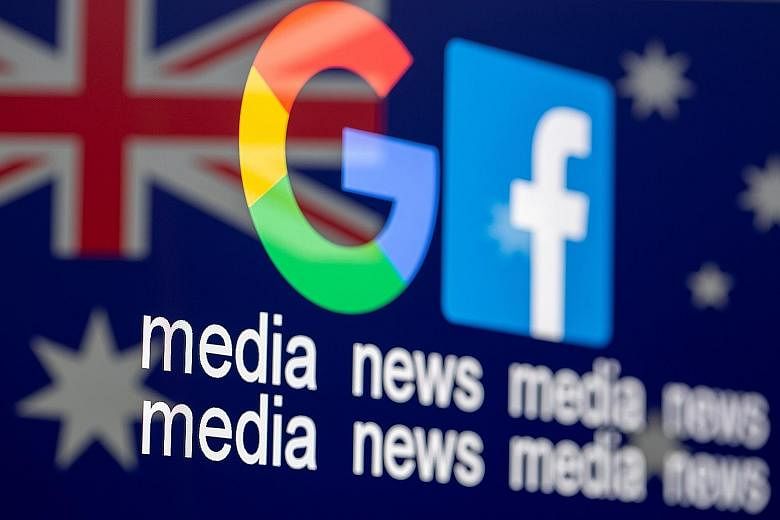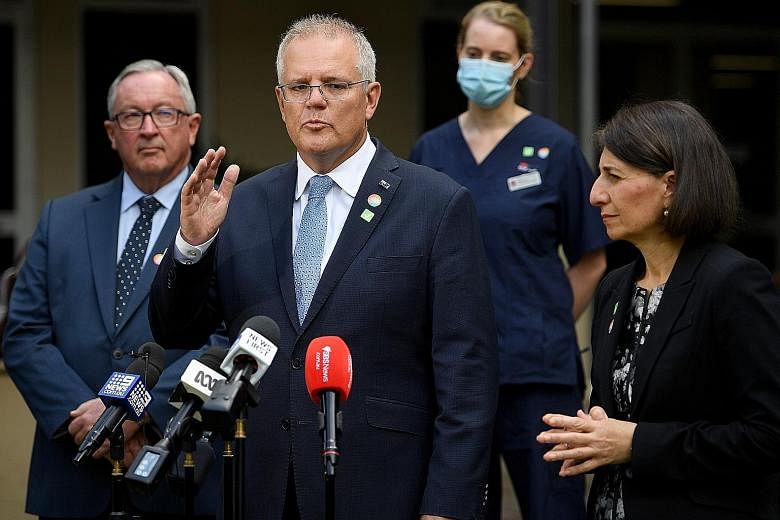SYDNEY • Australian Prime Minister Scott Morrison yesterday vowed to press on with legislation to force Facebook to pay news outlets for content, saying he had received support from world leaders after the social media giant blacked out all media.
Facebook stripped the pages of domestic and foreign news outlets for Australians and blocked users of its platform from sharing any news content on Thursday, saying it had been left with no choice ahead of the new content law.
The move, which also erased several state government and emergency department accounts as well as nonprofit charity sites, caused widespread outrage.
Facebook restored some government pages later, but those of several charity, nonprofit and even neighbourhood groups remained dark.
Mr Morrison, who blasted Facebook on its own platform for "unfriending" Australia, said the leaders of Britain, Canada, France and India had shown support.
"There is a lot of world interest in what Australia is doing," Mr Morrison told reporters in Sydney. "That is why I invite... Facebook to constructively engage because they know that what Australia will do here is likely to be followed by many other Western jurisdictions."
The Australian law, which will force Facebook and Google to reach commercial deals with Australian publishers or face compulsory arbitration, has already been cleared by the federal Lower House and is expected to be passed by the Senate next week.
Australian Treasurer Josh Frydenberg said he had spoken to Facebook CEO Mark Zuckerberg for a second time after the blackout.
"We talked through their remaining issues and agreed our respective teams would work through them immediately. We'll talk again over the weekend," he tweeted.
In its statement announcing the move in Australia, Facebook said the Australian law "misunderstood" its value to publishers.
Facebook and Alphabet-owned Google had campaigned together against the law, with both threatening to withdraw key services from Australia.
Google, however, announced a host of preemptive licensing deals over the past week, including a global agreement with News Corp.
Facebook's move had an immediate impact on traffic to Australian news sites, according to early data from analytics firm Chartbeat.
Total traffic to the sites from various platforms fell from the day before the ban by around 13 per cent within the country and by about 30 per cent outside the country. Traffic to Australian news sites from Facebook alone plummeted from 21 per cent to 2 per cent within Australia, and from 30 per cent to 4 per cent outside the country.
News Corp Australasia executive chairman Michael Miller confirmed the impact but said the number of Australians visiting the company's websites directly had risen.
"Definitely referral traffic was non-existent... while at the same time direct traffic to our websites was up in double digits," he said.
Mr Miller suggested that the anti-trust regulator, the Australian Competition and Consumer Commission, should scrutinise Facebook's move.
Canada's Heritage Minister Steven Guilbeault late on Thursday said his country would adopt Australia's approach as it crafts its own legislation in the coming months.
"Canada is at the forefront of this battle... we are really among the first group of countries around the world that are doing this," Mr Guilbeault said, vowing that the country would not back down if Facebook imposed the same action on Canada.
Canadian media organisations last year warned that the country would lose 700 print journalism jobs out of 3,100 in total, if the government did not act.
Mr Guilbeault said Canada could adopt the Australian model, which requires Facebook and Google to reach deals to pay news outlets whose links drive activity, or agree on a price through binding arbitration.
Another option is to follow the example of France, which requires large tech platforms to open talks with publishers seeking remuneration for use of news content.
"We are working to see which model would be the most appropriate," Mr Guilbeault said, adding that he spoke last week to his French, Australian, German and Finnish counterparts about ensuring fair compensation for content.
"I suspect that soon we will have five, 10, 15 countries adopting similar rules... Is Facebook going to cut ties with Germany, with France?" he asked, saying that at some point Facebook's approach would become "totally unsustainable".
REUTERS


